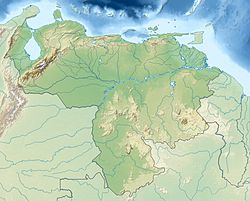Caracas | |
|---|---|
| Santiago de León de Caracas | |
(From top, left to right) Plaza Venezuela; Plaza Francia; Parque Cristal in Los Palos Grandes; Nuestra Señora de Lourdes Church; Parque Central Complex | |
|
| |
| Nicknames: La Sucursal del Cielo La Ciudad de la Eterna Primavera La Odalisca del Ávila La Sultana del Ávila | |
| Motto: Seguid El Ejemplo
Que Caracas Dio. (Then Follow the Example that Caracas Gave.) | |
Location in Venezuela and South America | |
| Coordinates: 10°28′50″N 66°54′13″W / 10.48056°N 66.90361°W | |
| Country | Venezuela |
| State | Capital District |
| Founded | 25 July 1567 |
| Founded by | Diego de Losada |
| Government | |
| • Type | Mayor–council |
| • Body | Government of the Capital District |
| • Chief of Government | Jacqueline Faría |
| Area | |
| 433 km2 (167 sq mi) | |
| • Metro | 4,715.1 km2 (1,820.5 sq mi) |
| Elevation | 900 m (3,000 ft) |
| Highest elevation | 1,400 m (4,600 ft) |
| Lowest elevation | 870 m (2,850 ft) |
| Population (2022) | |
| 3,242,000 | |
| • Density | 7,060/km2 (18,285/sq mi) |
| • Metro | 5,297,026 |
| Demonyms | Caraquenian (Spanish: caraqueño (m), caraqueña (f)) |
| Time zone | UTC−04:00 (Venezuela Standard Time) |
| • Summer (DST) | (Not Observed) |
| Postal codes[1] | 1000–1090, 1209 |
| Area code | 212 |
| ISO 3166 code | VE-A |
| Website | www |
| The area and population figures are the sum of the figures of the five municipalities (listed above) that make up the Distrito Metropolitano. | |
Caracas (/kəˈrækəs, -ˈrɑːk-/ kə-RA(H)K-əs, Spanish: [kaˈɾakas]), officially Santiago de León de Caracas (CCS), is the capital and largest city of Venezuela, and the center of the Metropolitan Region of Caracas (or Greater Caracas).[2] Caracas is located along the Guaire River in the northern part of the country, within the Caracas Valley of the Venezuelan coastal mountain range (Cordillera de la Costa). The valley is close to the Caribbean Sea, separated from the coast by a steep 2,200-meter-high (7,200 ft) mountain range, Cerro El Ávila; to the south there are more hills and mountains. The Metropolitan Region of Caracas has an estimated population of almost 5 million inhabitants.
The historic center of the city is the Cathedral, located on Bolívar Square,[3] though some consider the center to be Plaza Venezuela, located in the Los Caobos area.[2][4][5] Businesses in the city include service companies, banks, and malls. Caracas has a largely service-based economy, apart from some industrial activity in its metropolitan area.[6] The Caracas Stock Exchange and Petróleos de Venezuela (PDVSA) are headquartered in Caracas. Empresas Polar is the largest private company in Venezuela. Caracas is also Venezuela's cultural capital, with many restaurants, theaters, museums, and shopping centers. Caracas has some of the tallest skyscrapers in Latin America,[7] such as the Parque Central Towers.[8] The Museum of Contemporary Art of Caracas is one of the most important in South America.[9]
- ^ "Postal Codes in Caracas". Páginas Amarillas Cantv. Archived from the original on 12 April 2018. Retrieved 30 December 2015.
- ^ a b "Caracas, Presente y Futuro: Ideas para Transformar una Ciudad". Alcaldía de Caracas. 1995.
- ^ Martín Frechilla, Juan José (2004). Diálogos reconstruidos para una historia de la Caracas moderna. Caracas, Venezuela: CDCH UCV.
- ^ "Plaza Venezuela (Caracas) – Ciberturista". Ciberturista (in European Spanish). 2 January 2010. Archived from the original on 15 May 2018. Retrieved 14 May 2018.
- ^ Rodríguez, Verónica; Valero, Carla. "Una rayuela que se borra y se vuelve a dibujar cada día. Semblanza de lugar sobre la transformación urbanística y cultural de Sabana Grande" (PDF). Tesis de Grado. Archived from the original (PDF) on 10 September 2016. Retrieved 15 March 2018.
- ^ "Caracas". Caracas.eluniversal.com. Archived from the original on 3 September 2008. Retrieved 30 April 2010.
- ^ "The Skyscraper Center". www.skyscrapercenter.com. Archived from the original on 3 May 2018. Retrieved 3 May 2018.
- ^ "Caracas The Skyscraper Center". skyscrapercenter.com. Archived from the original on 2 May 2018. Retrieved 1 May 2018.
- ^ Valentina Quintero. 1998. Venezuela. Corporación Venezolana de Turismo. Caracas. 118p.







